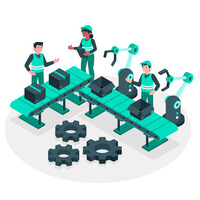The manufacturing industry has always been at the core of economic development, and in recent years, it has seen significant transformations. Traditionally reliant on manual labor and outdated technology, manufacturing companies have been gradually adopting newer technologies and IT solutions to streamline processes, improve productivity, and drive innovation.
The Role of IT Solutions in Manufacturing
IT solutions in the manufacturing industry are designed to address a wide range of challenges and optimize various aspects of the production process. From enhancing supply chain management to improving production quality, these solutions play a pivotal role in shaping the future of manufacturing. They enable manufacturers to make data-driven decisions, automate processes, and ensure greater visibility into operations.
Here are some key areas where IT solutions are having a significant impact:
1. Supply Chain Optimization
Supply chain management is one of the most critical aspects of manufacturing. IT solutions help optimize every step of the supply chain, from procurement to distribution. Advanced software systems such as Enterprise Resource Planning (ERP) systems allow manufacturers to track inventory in real-time, forecast demand, and automate procurement processes.
2. Automation of Production Processes
The integration of IT solutions in manufacturing has also led to the automation of production processes, which reduces human error, improves precision, and boosts overall efficiency. Manufacturing Execution Systems (MES) help monitor and control production processes, ensuring that everything runs smoothly and according to plan.
3. Data-Driven Decision Making
One of the most significant benefits of IT solutions in manufacturing is the ability to harness the power of data. Data analytics tools allow manufacturers to collect and analyze vast amounts of information generated during the production process.
4. Enhanced Customer Experience
IT solutions also enable manufacturers to enhance their customer experience. Through customer relationship management (CRM) systems, companies can better understand customer needs, track orders, and provide more personalized services. The integration of IT solutions allows manufacturers to respond more quickly to customer demands, improving satisfaction and loyalty.
The Role of IoT in Manufacturing
The Internet of Things (IoT) is a game-changer for the manufacturing industry. IoT in manufacturing refers to the network of connected devices, sensors, and machines that communicate with each other and share data in real-time. When integrated with IT solutions.
Let’s explore some of the key benefits of IoT in manufacturing:
1. Predictive Maintenance
One of the most significant advantages of IoT in manufacturing is predictive maintenance. Traditional maintenance practices often rely on scheduled or reactive maintenance, which can lead to costly downtime and equipment failures. With IoT-enabled sensors, manufacturers can continuously monitor the condition of machinery and equipment, detecting potential issues before they lead to breakdowns.
2. Real-Time Monitoring and Process Optimization
IoT devices provide real-time data on production processes, allowing manufacturers to monitor performance and make adjustments instantaneously. For instance, sensors embedded in machines can track metrics such as temperature, pressure, and speed, providing insights into how efficiently equipment is operating.
3. Supply Chain Visibility
IoT in manufacturing enables greater visibility into the supply chain. IoT-enabled devices can track the movement of goods and materials in real-time, providing accurate information about stock levels, shipments, and deliveries.
4. Energy Management
Manufacturing is an energy-intensive process, and managing energy consumption is crucial for reducing costs and improving sustainability. IoT sensors can monitor energy usage across the entire facility, identifying areas where energy consumption can be reduced.
The Synergy Between IT Solutions and IoT
While IT solutions and IoT are powerful on their own, their integration creates a synergy that drives even greater efficiencies and innovation. By combining IT solutions such as ERP systems, MES, and data analytics with IoT devices, manufacturers can create a fully connected, intelligent manufacturing environment.
Overcoming Challenges and Ensuring Successful Implementation
While the benefits of IT solutions and IoT in manufacturing are undeniable, implementing these technologies can present certain challenges.
However, the long-term benefits far outweigh these challenges. To ensure successful implementation, manufacturers should take a strategic approach by:
-
Investing in Training: To fully leverage the power of IT solutions and IoT, manufacturers must invest in training their workforce. Employees should be equipped with the skills to manage and operate new technologies effectively.
-
Choosing the Right Solutions: Selecting the right IT solutions and IoT devices is crucial. Manufacturers should work with trusted vendors and ensure that the systems they choose align with their specific needs and goals.
-
Fostering a Culture of Innovation: Successful digital transformation requires a culture that embraces innovation. Manufacturers should encourage experimentation and continuous improvement.

